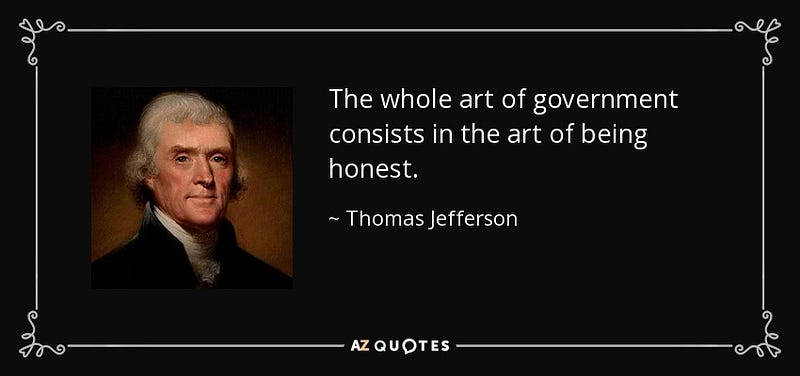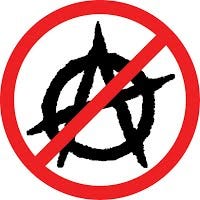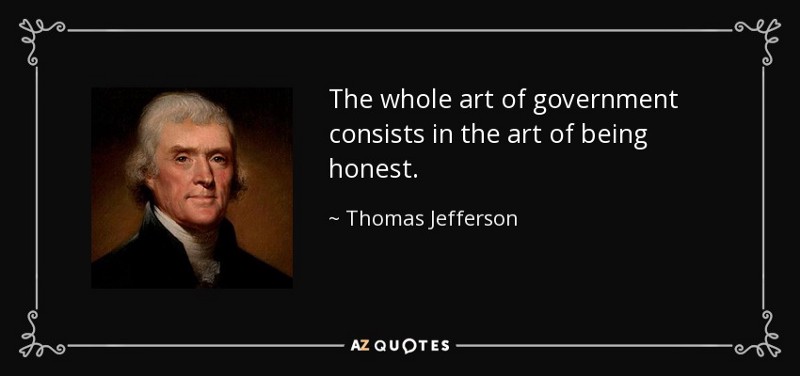In his analysis of classical liberalism, Ludwig von Mises [1] poses the question:
In opposing government interventions, is liberalism not implicitly bound to advocate some form of anarchy in the end?
Anarchy ≠ Libertarian
Anarchy in all its forms is simply a means to promote the philosophy of collectivism. Be with the herd, do as you’re told, don’t think we will do it for you. So is the true mantra of the ‘free’ anarchist. There is no such thing as anarcho-capitalism, there is socialism. It was Marx who sought the abolition of the state, and it is Marxian theory in another form that leads to the misnamed anarcho-capitalist attack on true capitalism.

Mises rightly argues that “the anarchists consider state, law, and government as superfluous institutions in a social order that would really serve the good of all, and not just the special interests of a privileged few.” They in effect throw away the baby and the bathwater thinking wrongly that all government is equal.
Such a utopian view of society leaves “the anarchist [a]s mistaken in assuming that everyone, without exception, will be willing to observe these rules voluntarily.” They falsely assume that all members of a society will naturally decide to fit in.
Bitcoin is an immutable evidence system, it provides the rule of law universally to all. It applies to people, corporations, and the state. In making all things available, auditable, and able to be reviewed, Bitcoin creates a framework that can lead to an honest system. Yet, a framework alone cannot create a sound system, for all people need to be vigilant.

As with all utopian philosophies, the anarchist misunderstands the real nature of man. We do not exist in a world of angels and saints, but one of disagreement, conflict, and imperfection.
Liberalism is not anarchism, nor has it anything whatsoever to do with anarchism.
In saying so, Mises is arguing that capitalism cannot exist in an anarchist system; it requires law. Even in a system of law and punishment, people commit heinous crimes. They commit sexual assaults, they murder, and they steal, and yet the anarchist believes that once law has been removed, all people within a society will suddenly become voluntaristic and one without force. The delusion shows no logical thought.
Mises saw the deception and the need for limits. Might does not make right, and for society to work, we need controls.
Liberalism is therefore far from disputing the necessity of a machinery of state, a system of law, and a government. It is a grave misunderstanding to associate it in any way with the idea of anarchism. For the liberal, the state is an absolute necessity, since the most important tasks are incumbent upon it: the protection not only of private property, but also of peace, for in the absence of the latter the full benefits of private property cannot be reaped.
Anarchy is rooted in a misleading concept mandating the dismantling of all government. It insists that no leaders can exist, no government whatsoever. Others, more on the borderline, insist on the complete privatisation of government with the claim that commercial government cannot be corrupt (ignoring Enron, Maddoff, and the multitude of corporate frauds).
They cry that a consistent mantra of government is force. Yet they ignore how a society may exist even when privatised. When pressed as to the question of how punitive measures will be taken against those committing crimes against another person, a response is always given through a form of government. Even Rothbard completely missed the contradiction in his hatred of government. His self-refuting ideal discredits his thesis.
Rothbard is not libertarian, he is the most insidious attacker undermining the ideas of Mises and Hayek. In calling for a court, Rothbard in addressing crime creates a contradiction. Crime is not contractual. Murray Rothbard understands this very well, and uses the lack of understanding of jurisprudence to mislead his reader. It creates a system of “Might is right.” An encoded axiom of law that is said not to be of the state but of a voluntary constitution of man, and yet, what is government? The federalist system of the United States was just the same idea.
In a competing court system where the accused can shop for jurisdiction, the rich and the powerful exceed the right of the victim for redress. Such an abject opposition to monopoly in any form is itself opposed to freedom. Monopoly exists in every system, it is not something to be expunged completely, but something to be managed by a means that delivers the optimal and most efficient results.
Rothbard proposes the lore of the Hatfields and McCoys. It’s a system that allows one to go through a personal retribution process taking the law into one’s own hands. And when the wrong victim has been selected for retribution, there is a system of allowing retribution back in an endless stream of attack. It is a philosophy of a man who hates and wants to see things burn.
Worse, it is hypocritical and contradictory. For the system proposed is itself a state and the government, but the people Rothbard preaches to are deluded into believing that such a system will be different. Like Marx, the Rothbardian attack on capitalism is insidious.
It is said [2] that crimes against another or the property of an individual can be codified and held within the system of private courts. Yet, where is such a governing body to set a standard in civil laws? If all members of a society subscribe to different and possibly conflicting courts and laws — then there is no law. To have a set of civil laws, even mere property law, and contract requires codification, and the contradiction in saying that it can be individually agreed upon for every contract remains unnoticed throughout the anarchist false and twisted promotion of an artificial freedom.
A legislature is necessarily required for the codification of law. A judiciary becomes necessary to deal with the societal rights violations that can and shall occur, which is admitted with the call for no leaders, no king, neglecting that the judiciary and legislative bodies are in themselves government.
The anarchist reasons that societies are enslaved by government in some way and thus liberty is repressed. Yet we are not animals, humans are more. The polis, the city, the state define us as more.

In a stateless society, if a utopian ideal could ever be created, we end in a system of corporate oppression. For people will freely come together and form corporations, it is their right. They will do so as they banded in states of anarchy to form feudal kingdoms. People will sacrifice personal liberty and freedom to a baron or overlord for protection. And the corporations will have the power to buy courts, to own courts, and to choose their jurisdiction in a manner that allows them to be above the law. Such is the outcome of the anarchist lie of “no-state capitalism.”
It is “Might makes right.”
And it is a simple conclusion to find and determine, for the individual is always going to be less capable than a corporate body. And corporate bodies will always form. Some will always choose to form groups and relegate their power through another. There will always be some who choose certainty over freedom.
All societies throughout history that have built civil law on a sound foundation of natural law with government that understands freedom and personal rights grow faster and deliver peace, prosperity, and liberty. Without it, no society can thrive and all become corrupted. It requires vigilance for us to remain free. We should not be taught not to talk about government and politics but rather to debate both with vigour and enthusiasm and gusto.
For it is not government itself that is the problem, it is the natural state of all systems in the world to decay. The only way that we can stop corruption is through active work. If we own a house and we do not maintain it in time, it will fall apart. If we do not paint the walls, the wood underneath will eventually rot and decay. Likewise, all governments become corrupt when people do not fight for the rights of civil law and liberty.
It is not the abolition of the state that will set us free, it is the involvement of people in the state seeking honest government and freedom that creates an environment of positive growth and empowerment for all.
Anarchy is not libertarian. It is yet another attack, a utopian ideal that can never be achieved and a path to power for those seeking rule over the others in their group.
Most of the collectivist camp now call themselves progressives. It is a modified form of the prior term socialism. Such a collectivist attack on free society is a pincer movement. The progressives attack from one side and the voluntarists from the other, for the anarchist is truly a collectivist at heart. In each case, the truth is repackaged to increase the appeal of what is a bitter pill.
A free-market society requires a sociopolitical economic system that is designed to maximise the peace, prosperity, and freedom of all the individuals within it. In it, government is necessary to grant, ensure others respect, and recognise certain rights. Government is needed to protect and defend rights; we are not all equal in power or ability. What is important, though, is to ensure that government is limited and the powers of the government are controlled and restrained through the jurisdiction of the people. It is the right of the people to ensure that they have a government whose primary if not sole function is to defend the inalienable natural rights of the individual through the rule of law.
From Plato [3], we can see that justice involves “the having and doing of one’s own and what belongs to oneself” (434a). Here, it can be extended such that both excess and deficiency may be seen as unjust. The Platonic definition of justice seems plausible when viewed in such a way. All things are not equal, and nor can they be. It is the greatest of injustice to hold back the ones who can thrive so that they will be equal to all others. It is unjust to take from those who work the hardest to support those who are lazy.
A Platonic conception of justice comes from a conviction that everything in nature is constructed through a hierarchy. People are no different. We can seek to promote honesty and fairness, but some will always achieve more than others, and not just through luck. It is easy to say that luck is the cause of many people’s success, but to say so is a cop-out.
Luck itself is created through hard work.
Plato did not form a concept of an ideal state. He, like everyone, exists as a product of their own time. He could not know what would be discovered in the future, nor could he know the flaws in any arguments that originated from a false understanding of science at the time. All systems evolve, and the state evolves too, for the state is people.
It is the people in a society, and if they want a free open state, they need to be involved. If you are not, you are relegating and delegating control and freedom to the hands of others. It may be your right, but equally, if you forgo such a right, you forgo the right to complain.
So, I am called a statist by the anarchists who seek collectivist control and a means to silence me. In their own hypocrisy, they seek to repress my right to act as I will, and do not understand that in a society they would create, I would rule.
So, being a statist as the anarchists define it is no insult. Mises (by such a definition) was a statist. Adam Smith was a statist. Thomas Jefferson and Benjamin Franklin and George Washington were all statists.
We all believe in the rule of law and efficient government.
If a belief in a small efficient government means now being a statist, then I am proud to be a statist, I am proud to support and fight for freedom against the collectivist delusion and the grasping for power from the anarchist and progressive hypocrites that have become all too common within our society.
Just say no to anarchy.
References
[1] Mises, L.: Liberalism in the Classical Tradition (1927). Retrieved from http://mises-media.s3.amazonaws.com/Liberalism%20In%20the%20Classical%20Tradition_3.pdf
[2] Rothbard, M.: Man, Economy, and State, with Power and Market (1962). Retrieved from http://mises.org/library/man-economy-and-state-power-and-market
[3] Plato: The Republic.

